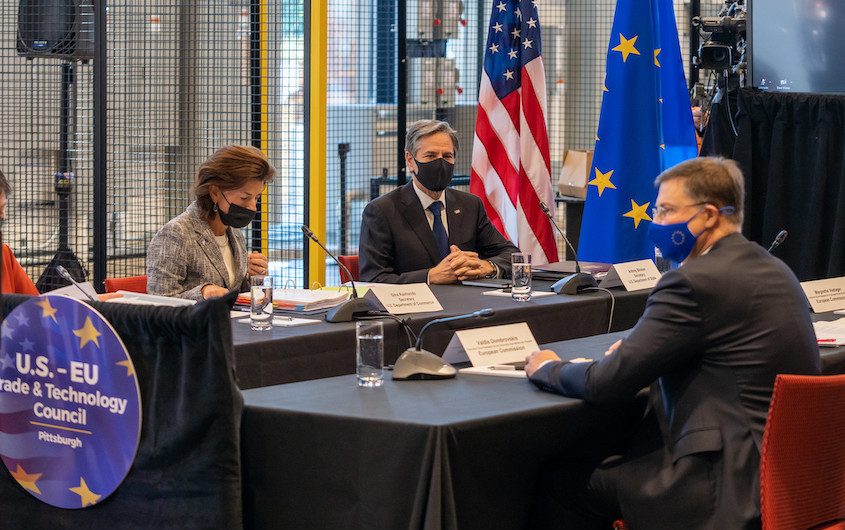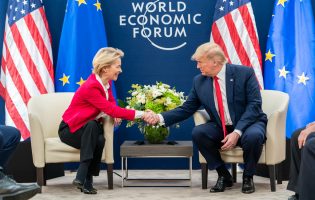
U.S. Department of State via Flickr
The Potential Role of the U.S.-EU Trade and Technology Council in a Rapidly Changing Global Economic Order

Thomas J. Duesterberg
Hudson Institute
Thomas J. Duesterberg is a senior fellow at Hudson Institute. An expert of trade, manufacturing, economics, and foreign policy, Dr. Duesterberg leads project work on trade with Europe and China, reform of the World Trade Organization (WTO), global competition in advanced technologies such as 5G, and the strength of the U.S. manufacturing sector.
Previously, Dr. Duesterberg was executive director of the Manufacturing and Society in the 21st Century Program at the Aspen Institute. From 1999 to 2011 he served as president and CEO of the Manufacturers Alliance/MAPI, an economic research and executive education organization based in Virginia. He was also director of the Washington office of Hudson Institute, assistant secretary for international economic policy at the U.S. Department of Commerce, chief of staff to Rep. Chris Cox and Sen. Dan Quayle, and associate instructor at Stanford University. He co-wrote U.S. Manufacturing: The Engine of Growth in a Global Economy and three other books, and is the author of over 200 articles in journals and major newspapers. He is on the Board of Advisors of the Manufacturing Public Policy Initiative at Indiana University’s School of Public and Environmental Affairs, and the Board of Trustees of the American University of Rome. He is a graduate of Princeton University (B.A.) and Indiana University (M.A., Ph.D.).
In an important speech on April 13, U.S. Treasury Secretary Janet Yellen stated that “…the war between Russia and Ukraine has redrawn the contours of the world economic outlook.” Amid the larger human tragedy and geopolitical consequences of the war that she discussed, Yellen also stated baldly that: “…we can no longer extend to you (Russia) the privilege of trading or investing with us.” The Russian aggression caps a long period of deterioration in the workings of a global, rules-based order. The rise of China as a mercantilist power, the serial interruptions in supply chains from the Covid pandemic and natural disasters, the rise of what some have labeled “techno nationalism” or “competitive autarchy,” and the waning ability of the World Trade Organization (WTO) to mediate disputes and develop new rules for the modern economy all contributed to a loss of confidence and effectiveness of the post-World War Two economic order. The clear support of China for the Russian aggression also motivated Yellen to state that: “The world’s attitude toward China and its willingness to embrace further economic integration may well be affected by China’s reaction to our call for resolute action on Russia.”
In view of all these paradigm shifts it is worthwhile to consider how the transatlantic architects of the post-war order can build on their rediscovered sense of common purpose in responding to Russia’s invasion of its neighbor to address the question of constructing a revised economic system that better responds to the new realities. One response would be a renewed effort to repair the flaws and dysfunctions of the WTO. But even in the wake of U.S.-EU cooperation in 2022, neither side appears ready to invest the political capital to fix both functional problems like the flawed dispute settlement regime and such long standing bilateral differences as those involving agricultural and regulatory policies. Even if the United States and the EU were to redouble resolve for WTO reform, the paralysis of the institution due to North-South differences and the role of outliers like China, India, and South Africa in achieving consensus makes such efforts unlikely to succeed.
Another impediment to a WTO (or global as opposed to regional or bilateral) approach to reform lies in the responses on both sides of the Atlantic, and in Japan and India as well, to supply chain disruptions and Chinese mercantilism. Responding to these vulnerabilities, there has been a revival of interest in industrial policies to support vulnerable industries like semiconductors, battery technologies, vaccine production and industries of the future such as cloud services and renewable energy technologies. The proliferation of ideas, and increasingly financial commitments, for reshoring industries or standing up new ones in the interests of resilience and national or economic security makes any attempt to modernize WTO rules to address Chinese subsidies for its own national champions highly problematic.
Despite the numerous problems that have undermined U.S.-EU cooperation in the last decades, the newfound common purpose in overturning the Russian invasion along with the settling of major bilateral irritants in the metals and Airbus trade disputes open a window to at least some new cooperative efforts. Transatlantic leaders have already committed to serious work in the U.S.-EU Trade and Technology Council (TTC), now scheduled to meet again outside Paris in mid-May. Although hopes for progress remain modest, this process could build on the rapid pace of new joint work since February 24 to address some pressing issues. Success in finding solutions to discrete problems can open the way to larger ambitions in the future.
The working group of the TTC on export controls has already been contributing to a joint approach to sanctions on Russia. Export controls on defense-related and dual-use technologies are having a major impact on Russia’s ability to wage war and keep its economy from collapse. Sanctions on sectors like aircraft could not be effective unless the United States and the EU, the technology leaders in this sector, developed an agreed-on set of tactics. The TTC is also continually analyzing current and potential sanctions to weaken Russian resolve and ability to keep its war machine functional.
On a longer-term horizon, a joint effort in delineating what technologies, especially dual-use, are essential for national defense is badly needed. This applies not only for the response to Russia, but eventually for other strategic adversaries. As Janet Yellen observed, China will have to decide if it wants to plant its flag firmly and permanently with that of Russia, in which case some export controls and sanctions may be appropriate for that rising power. Any extrapolation of sanctions to include China would be more difficult for Europe, whose export-oriented economy is more dependent on the Middle Kingdom than that of the United States, but forums like the TTC ought to be helpful in evaluating the need for such broader sanctions. It is also worth noting that the trilateral (U.S.-EU-Japan) dialogue on reforming WTO rules for subsidies, with Chinese practices as a motivating force, is a good precedent for extending cooperation from the transatlantic to a wider geographic and economic sphere of like-minded countries.
Another very useful task for the TTC would be as a damper for unbridled “techno nationalism” that is clearly a growing reality: witness the efforts on both sides of the Atlantic for building vertically integrated domestic supply chains in technically complex sectors like semiconductors and quantum computing. In the former, both the United States (design, software, and some fabrication) and the EU (advanced production equipment) have strengths which are very costly and difficult to duplicate. The TTC could play a valuable role in any number of industries—pharmaceuticals, avionics, artificial intelligence, rare earths, and advanced batteries—where some international division of labor among “reliable allies,” as Yellen argued, would encourage economic efficiency and reduce the dangers of competitive nationalism. Such competition undermines both transatlantic cooperation and the fundamental principles of the WTO.
Two sectors important to the 21st century economy—green technology and telecommunications—also merit some discussion and possible cooperation through the TTC. In both sectors, China has established dominant global positions by deploying its usual arsenal of subsidies, technology appropriation, massive government support for research and production, favorable financing for exporters and third-country infrastructure projects, and protection of its huge domestic market to build scale efficiencies and capture global market share. In both cases, early U.S. and EU technology leadership has been eroded by Chinese mercantilism. The EU is a leader in wind technology, with the United States not far behind, but is steadily losing market share to much cheaper Chinese competitors. This process mirrors that a few years earlier for the solar panel industry. As advanced economies transition to a less carbon intensive energy system, strengthening the competitive position of transatlantic firms will be important to both job creation and manufacturing leadership. Sanctioning the Chinese exploitation of domestic labor for manufacturing and of labor in third countries for mining minerals required for batteries as well as solar cells and deploying antidumping measures on some coordinated basis could help reverse the erosion of transatlantic green industries.
In the telecommunications industry, U.S. equipment makers were basically driven out of business by subsidized Chinese competitors. Europe has built viable competitors in Nokia and Ericsson but has managed to maintain its global market share with difficulty. Nonetheless the European telecommunications giants have been aided by Western sanctions on Chinese firms. Both the United States and EU remain competitive in developing mobile services, which provide the lion’s share of profits in this sector. But some cooperation in developing these services, while protecting Western populations from the dangers of the Chinese system, which is partly designed for surveillance and gathering of big data, as 5G and successive generations are created would be beneficial to protecting sensitive communications networks. Some discussion of the promise and development of the new software and cloud-based systems using the Open Radio Access Network (Open RAN) technologies could solidify transatlantic leadership in this sensitive and economically crucial sector of the modern economy.
As it has for the export controls working group, the TTC can also play an important role in carefully evaluating and delineating the scope of technology and industrial sectors that require some intervention to maintain national security and resilient supply chains. On both sides of the Atlantic, the use of national security and economic security as justification for government intervention, including subsidies or various forms of protectionism, has grown in recent years and ought to be carefully delimited by thoughtful consideration of the real interests at stake. Discussing these questions at an international level can help head off the dangers to an open trade regime and the underlying rules which allow it to function from the growing tendencies toward competitive autarchy.
A common denominator for utilizing the potential of the TTC across all these sectors is the importance of working collaboratively on the standards which define the operating systems for all modern technology-based systems. The TTC has already started work in this important arena. It is of growing urgency since China has set as a national goal of playing a larger and more dominant role in setting global standards, especially in crucial sectors like quantum computing, communications, and the energy grids of the future. China is increasingly employing substantial investments in research to innovate and secure patent protection for cutting edge technologies. However research has shown that in both the telecommunications and wind energy fields its numerical dominance in patents is not reflected in the quality of these patents. This can be measured by their use in terms of citations in scientific and engineering journals and in adoption of “standard essential patents.” Nonetheless, the Chinese ambition to win acceptance of new standards by flooding the international standards making bodies with their own private firms and public officials has had some impact on those bodies. The TTC should consider how best to preserve the private sector-led and quality-driven traditional standards making procedures to counter Chinese tactics. On both sides of the Atlantic, some consideration of assisting private sector participation in the meetings of standards bodies, which require substantial investments of time and financial support, and of public sector oversight would help maintain a level playing field.
In summary, the TTC can in the near term serve as something of a buffer against a drift—some might label it a rush—toward competitive industrial policies. At the same time, it could contribute to a more efficient utilization of economic resources in the transatlantic sphere. On a more geopolitical level, the TTC can help coordinate, and thus make more effective, the deployment of economic sanctions on outliers like Russia. In the longer term, the U.S. side would like to extend the work of the TTC to build a joint set of countermeasures to Chinese mercantilism and its undermining of global economic and human rights rules, and its lack of effective cooperation in addressing the Covid pandemic. Europe has not fully agreed to such a broad agenda, but China’s support for Russian aggression appears to have opened a window to more reflection on the value of this sort of cooperation. But the habits of working together on Russia and on avoiding overreliance on autarchic industrial policies could build a base for a broader role for the TTC in the future.









